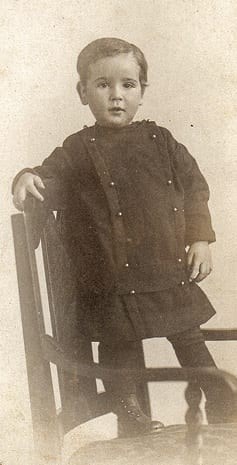Family history lives again
BY LOIS LA CROIX Special to the VOICE
I am proud to say I have kept my New Year’s resolution…and it’s only the second week of March!
Okay, so maybe I haven’t fully completed it, but I am well on my way to put this baby to bed before the calls of gardens and golf courses beckon. Time is moving quickly!
After both of my parents died, I ended up with two bins that held pieces of my father’s life. He was 89 years old when he died in 1997. The blue plastic bins had been stored in the basement of my home since my mom died in 2004. They travelled with me ten years later, unexplored, when we moved to Pelham, and quickly found their way to a corner of the “new” basement. I have periodically shuffled them around these past five years to facilitate reaching other storage containers for Christmas decorations, seasonal clothing, etc., vowing each time to get through their contents one day.
 January 1, 2019 was the day! I announced to my husband and siblings that this was the year I was going to tackle the bins. Before I started to explore the contents, I suspected that most of what they held were papers related to Dad’s research as he compiled his family history, dating back to the early 1800s. I was stalling because I didn’t know what to do with those notes—his book was finished and published. I did some preliminary web-surfing for ideas and found resources and contacts for genealogy associations that might assist me in either cataloguing or posting information.
January 1, 2019 was the day! I announced to my husband and siblings that this was the year I was going to tackle the bins. Before I started to explore the contents, I suspected that most of what they held were papers related to Dad’s research as he compiled his family history, dating back to the early 1800s. I was stalling because I didn’t know what to do with those notes—his book was finished and published. I did some preliminary web-surfing for ideas and found resources and contacts for genealogy associations that might assist me in either cataloguing or posting information.
I was surprised when I began the job of sorting through bundled envelopes of letters and papers. I didn’t expect to find all the greeting cards Dad had kept —cards from us kids (there are five) wishing him a happy Father’s Day or happy birthday. There were completed income tax forms dating back to 1944, one of which contained a handwritten question to the Canadian government of the day, in 1974, as to how much jail time he would have to serve for tax evasion as they “discriminate against working people while Harold Ballard won’t be prosecuted or income tax evasion.”
I have found the birth notice of my grandmother, Daisy, dated May 1888 in Missouri, and the subsequent marriage certificate of Daisy and Sam, who was born in North Dakota, but later came to Manitoba to farm. How did these two individuals meet, and what brought them to Niagara, I wondered? I have discovered a Victory Loan application for bonds for the Dominion of Canada dated October 1945.
Among all the notes related to the search for familial links, there is a copy of the military certificate of a distant great grandfather who fought in the battle of Chippawa during the war of 1812.
The examination of the variety of notes, photographs and personal papers has prompted me to focus on times past. It has caused me to recall the times I spent listening to both my parents while I was at home with them, as they spoke about their youth and growing up. Conversations I wish I had been more attentive to, and which have left me trying to find their content in the caves of my memory. It has left me in awe of the passage of time, and, more so, led me to think about the concept of time and timelessness.

The feature of time we are most familiar with is that it passes, flowing over us like water over the rocks in Niagara. Like that flow of water, we have no control of time. We are born, we grow, and learn, build relationships and eventually we die. This aspect of time's flow is so deeply ingrained in our perception that it is not even questioned, despite many of us feeling that there is not enough of it, and some of us feeling that the days are too long.
Time is linked to change, whether it be as night becomes another day, or a calculated new year opens the gateway to another. Eckhart Tolle, the non-denominational spiritual teacher, notes that time is, “like a criminal, that leaves evidence everywhere.”
We see the evidence in ourselves, as hair changes colour and physical stamina diminishes. We see the evidence in our surroundings— what we perceived in days gone by has gradually melded into something different today. Society has developed a variety of methods and means to measure time and to segment it into blocks, thereby facilitating how we manage time and become efficient time managers. Our economy depends on productivity within these devised frames of time. Tolle comments that although we speak of the past and future, and frequently live in those domains, there is only the present that is our concern.
Despite that claim, it has been intriguing for me to explore the itemized expenses my grandmother paid out in the 1960s, to wonder what prompted a young Irishman to join the British military and end up fighting in a battle so close to the area I grew up in. I am amazed that these historical notations are now in my possession, after so much time has passed.
Carl Jung was of the opinion that time is relative, and to appreciate the whole of our life experiences we must reach beyond ideas of cause and effect and beyond imposed time frames to develop an approach that allows for exploration of coincidental experiences. The thought that so many serendipitous events, over hundreds of years, has led me, in 2019, to explore not only tangible evidence of past life events but also attempt to make sense of their connectedness is confounding. I have, in the process of fulfilling my New Year’s resolution, developed a higher appreciation of the concept of time. It has left me with the feeling that perhaps each of us represents but a granule of sand in time that will soon be washed over with water. Maybe Tolle is right—we need only concern ourselves with the present and direct our attention to conversations, relationships and tasks that confront us now. Soon enough, our life efforts may be confined to a blue bin, leaving others to contemplate artifacts that have been left behind. ♦
Everyone has a story. Send us yours for a future Column Six. [email protected]


